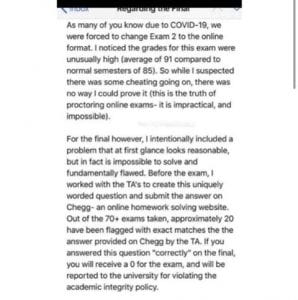 Lecturer statement reported by students:
Lecturer statement reported by students:
I worked with TA’s to create this uniquely worded question and submit the answer on Chegg – an online homework soling website… If you answered this question “correctly” on the final, you will receive a 0 for the exam, and will be reported to the university for violating the academic integrity policy.
What do students learn during your exam?
Students do learn during exams. If an exam contains deception or untruths, it potentially undermines the confidence or expertise of our graduates. If the exam reveals to them that our staff are hostile or unreliable, it undermines our value as an authoritative source for our graduates and their employers. Perverse strategies like this can only be defended if there is no other way to achieve our assessment aims.
There is a more honest and constructive path.
For example, giving advance notice, ahead of the exam period, that one of the questions is “impossible” and will be scored for insights rather than results. Or, if it’s a remotely proctored exam, include a question that calls for a “talk aloud” (real-time stream of consciousness) response. Or include questions that score students for evaluating alternative solutions in dialogue with another (assigned) student.
Cheating is a breach of trust. So is entrapment.
Why did you think the trust between you and students was stronger than their need to get a grade? Did students perceive your investment in relationship-building and their need for grades?
Let’s be clear. Publishing deliberate errors is not exemplary academic integrity.
Your assessment plan is broken.
Voiding 29% of your exam assessment indicates that you need a different assessment model. You can reduce the reward for misbehaviour by using incremental assessment. We have a large kit of alternatives to high-stakes closed-form exams.
Is cheating a professional competence?
If your discipline or industry regards high-stakes, closed-form exams as being the most authentic assessment, it has married tacit tolerance of this kind of cheating to strenuous denials. As an institution educating future professionals, we (ethically) owe students an honest appraisal of that context, and assistance in developing their optimal strategies for advancement. We need to ask how we can train students to excel in a cheating-prone discipline.
